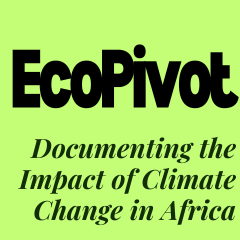In the heart of Nigeria, where the verdant landscapes of the south meet the fertile expanses of the north, a quiet yet indomitable voice rises above the clamour of climate chaos.
Oladosu Oluwaseun Adebola, an environmental activist and climate reporter, stands as a testament to the power of passion and perseverance.
Her journey from a concerned citizen to a climate advocate is a narrative of courage, resilience, and unwavering dedication.
Adebola’s fervour for climate advocacy is rooted in her profound connection to the natural world and a palpable sense of urgency driven by the visible impacts of climate change.
Living in Nigeria, she witnessed firsthand the devastation wrought by extreme weather events, the haunting disappearance of biodiversity, and the relentless march of environmental degradation, “Witnessing the tangible effects of climate change can be a powerful motivator,” she tells EcoPivot. These experiences planted the seeds of her activism, fostering a deep-seated desire to effect change.
As an environmental reporter, Adebola’s role transcends mere documentation; it is a mission to amplify the voices of those often marginalised in environmental discussions.
Her stories are not just accounts of catastrophe but are woven with threads of hope, showcasing innovative solutions and success stories that inspire others. “The urgency of the climate crisis, combined with the potential for meaningful change through informed storytelling, likely fuels my commitment to this field,” she says. The solidarity of like-minded individuals and communities also reinforces her resolve.

The Nigerian Conundrum
Nigeria faces a multitude of environmental challenges that require a concerted effort from both its government and citizens. Inadequate funding, lack of technical expertise, and political instability are formidable obstacles.
Yet, within these challenges lie opportunities for leveraging the country’s youthful population and burgeoning technological sector to drive innovation and solutions. “Addressing climate change and environmental degradation in Nigeria requires a collaborative approach involving both the government and citizens. Nigeria can make significant strides toward a more sustainable future by leveraging policies, investment in renewable energy, community involvement, and international cooperation. The integration of statistical insights helps underscore the urgency and scale of the challenges and opportunities in this endeavor,” she tells EcoPivot.
The statistics paint a stark picture: Nigeria loses about 3.5% of its forest cover annually, desertification threatens over 60% of its land, and pollution—both air and water—poses severe health risks. Over 25 million Nigerians are also at risk of coastal flooding.
Amidst all these, international collaboration emerges as a beacon of hope, offering funding, technology, and expertise crucial for combating these issues, she said. Through global partnerships, Nigeria can implement effective strategies to address deforestation, pollution, and the impacts of climate change, paving the way for a sustainable future.
Yet, Adebola believes the global response to climate change generally falls short in terms of scale and action:
“The global response to climate change has been a mixed bag of progress and setbacks. While there have been significant achievements in raising awareness, setting targets, and implementing policies, the overall pace and scale of action still fall short of what is needed to effectively address the climate crisis. While there have been notable strides in global climate action, urgent and transformative changes are needed to effectively address the climate crisis. This requires enhanced political will, equitable solutions, corporate responsibility, technological innovation, and international cooperation. By prioritising sustainability and resilience in all aspects of global governance and development, we can mitigate climate risks and build a more sustainable future for all.”


